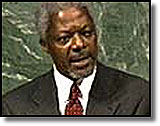
|
Annan Launches UN "Quiet Revolution"The United Nations Secretary-General, Koffi Annan, has unveiled a plan for the fundamental reform of the world organisation. Mr Annan declared that with the publication of the 95-page report, a "quiet revolution" within the UN had begun.The Ghanaian-born Mr Annan, who succeeded Egypt's Boutros Boutros-Ghali as Secretary-General, told the UN General Assembly: "The reforms I am proposing are bold reforms. They are the most extensive and far-reaching in the fifty-two year history of our organisation." Work on the report began soon after Mr Annan took over the post in January. It follows strong criticism of the UN by the United States, which has refused to pay the 1.6 billion dollars it owes the world body until it introduces reforms to drastically reduce inefficiency and waste. The White House, which strongly supported Mr Annan's candidacy for the Secretary-General's post, welcomed the report.
Included in the report are measures which Mr Annan can take now as well as recommendations which require member state approval. Among the proposed reforms are:
The plan also addresses the UN's grave financial crisis. Mr Annan wants to set up a revolving credit account with one billion dollars, in order to avoid relying on the UN's peacekeeping fund to subsidise the organisation as a whole. Predictably, perhaps, many UN Departments have criticised the reforms. However, according to Maurice Strong, a Canadian diplomat and one of the key reform architects, such resistance is in itself "real evidence of the seriousness of the change." |
Diana, Princess of Wales, 1961-1997
Conference 97
Devolution
The Archive
News |
Issues |
Background |
Parties |
Analysis |
TV/Radio/Web
Interactive |
Forum |
Live |
About This Site
News |
Issues |
Background |
Parties |
Analysis |
TV/Radio/Web
Interactive |
Forum |
Live |
About This Site
© BBC 1997 |
politics97@bbc.co.uk |

